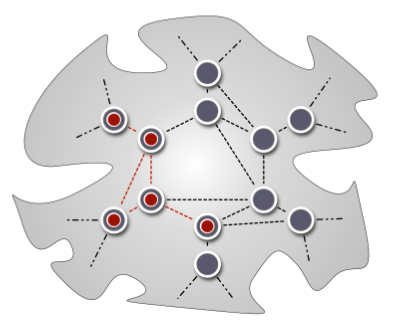
Abstract
Social networking is moving to mobile phones. This not only means continuous access, but also allows to link virtual and physical neighbourhood in novel ways. To make such systems useful, personal data such as lists of friends and interests need to be shared with more and frequently unknown people, posing a risk to your privacy. In this paper, we present our approach to social networking, Consistent Deniable Lying (CDL). Using easy-to-understand mechanisms and tuned to this environment, it enables you to meet new friends with joint interests while limiting exposure of your private data. Not only can it be generalised to include “friends of friends” (transitivity) into interest search, it allows you to plausibly refute any allegations of your claimed interests. Unlike prior work, we focus on the application to similarity finding and include the novel aspects of transitivity and deniability, which are key to success in social networks.
BibTeX (Download)
@inproceedings{Belle2008Consistent,
title = {Consistent Deniable Lying: Privacy in Mobile Social Networks},
author = {Sebastian Kay Belle and Marcel Waldvogel},
url = {https://netfuture.ch/wp-content/uploads/2008/belle08consistent.pdf},
year = {2008},
date = {2008-05-19},
urldate = {1000-01-01},
booktitle = {Pervasive 2008 Workshop on Security and Privacy Issues in Mobile Phone Use (SPMU 2008)},
address = {Sydney, Australia},
abstract = {Social networking is moving to mobile phones. This not only means continuous access, but also allows to link virtual and physical neighbourhood in novel ways. To make such systems useful, personal data such as lists of friends and interests need to be shared with more and frequently unknown people, posing a risk to your privacy. In this paper, we present our approach to social networking, Consistent Deniable Lying (CDL). Using easy-to-understand mechanisms and tuned to this environment, it enables you to meet new friends with joint interests while limiting exposure of your private data. Not only can it be generalised to include “friends of friends” (transitivity) into interest search, it allows you to plausibly refute any allegations of your claimed interests. Unlike prior work, we focus on the application to similarity finding and include the novel aspects of transitivity and deniability, which are key to success in social networks.},
keywords = {Opportunistic Networks, Peer-to-Peer, Privacy, Security, Social Networks},
pubstate = {published},
tppubtype = {inproceedings}
}



